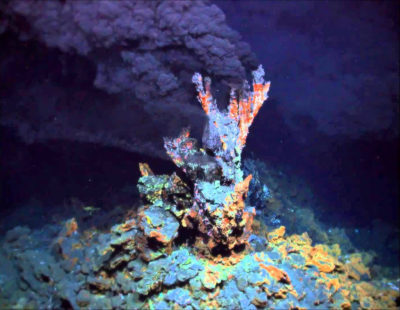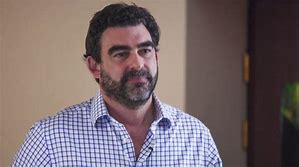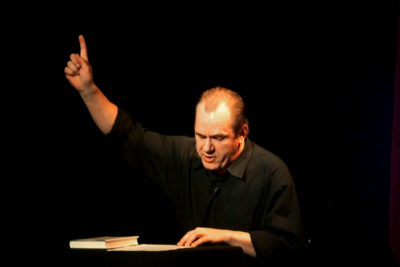 Origin of life researchers collected “new insights” from a new paper entitled “The origin of membrane biogenetics,” published in the December issue of the journal Cell. The media elevated the hype into an origin-of-life sea saga spectacle.
Origin of life researchers collected “new insights” from a new paper entitled “The origin of membrane biogenetics,” published in the December issue of the journal Cell. The media elevated the hype into an origin-of-life sea saga spectacle.
The journal Nature covered the paper in an article entitled “How life emerged from deep-sea rocks” by Ed Yong. The subtitle. “The origin of ion-pumping proteins could explain how life began in and escaped from undersea thermal vents,” seemed to seal the deal.
NBCNEWS.com featured the story with the title “Theorists are pumped up about their new origin of life proposal” by Tia Ghose. “A new theory proposes the primordial life-forms that gave rise to all life on Earth left deep-sea vents,” reported Ghose, “because of their ‘invention’ of a tiny pump.”
Researchers
Nick Lane (pictured right), of the Research Department of Genetics, Evolution, and Environment at the College of London, and William F Martin, of the Institute of Molecular Evolution at the Heinrich-Hein-Universitäts in  Düsseldorf, Germany, authored the journal Cell article.
Düsseldorf, Germany, authored the journal Cell article.
Lane and Martin had presented their work earlier at The Royal Society in November entitled “Energy transduction and genome function – an evolutionary synthesis.” Their work proposes that –
“Living organisms are self-replicating, self-sustaining systems. Newly emerging insights… [are] driving an evolutionary synthesis that is rooted in thermodynamics.”
New Origin of Life Pathway
“It is possible to trace a coherent pathway leading from no more than rocks, water, and carbon dioxide to the strange bioenergetic properties of all cells living today,” explained Lane, a revolutionary theory.
The core of Lane and Martin’s hypothesis begins with the energy released by deep-sea hydrothermal vents in the presence of rocks, water, and carbon dioxide that produces the organic chemistry of life. As Lane explains –
“Natural proton gradients acting across thin FeS [iron sulfide] walls within alkaline hydrothermal vents could drive carbon assimilation, leading to the emergence of protocells [primitive life] within vent pores.”
By “harnessing energy” from the deep-sea hydrothermal vents, Lane and Martin propose that life emerged from the “deep-sea.” Lane and Martin, however, call their idea a “hypothesis” − not a theory, as reported by NBCNEWS.com.
In terms of scientific evidence, however, they had none. Developing the conditions to test their origin of life hypothesis give pause. Jan Amend, a researcher at the University of Southern California, who was not involved in the study, commenting on LiveScience, noted –
“Mimicking natural conditions in the lab is a lot more difficult than it sounds.”
Origin of life Sea Saga Critics
 News media excitement over the hypothesis annoyed many origins of life researchers. Wolfgang Nitschke, a biochemist at the French National Center for Scientific Research in Marseille, noted in an interview with Nature that one of the significant problems with their theory –
News media excitement over the hypothesis annoyed many origins of life researchers. Wolfgang Nitschke, a biochemist at the French National Center for Scientific Research in Marseille, noted in an interview with Nature that one of the significant problems with their theory –
“[It is] in stark contrast to basically all other origin-of-life hypotheses.”
Stuart A. Newman, for example, professor of Cell Biology and Anatomy at the New York Medical College, takes a different approach. For Newman, the origin of life is a self-organization process that develops through a process of “dynamical patterning modules” − not through deep-sea thermal vents.
For American theoretical biologist Stuart Kauffman of the University of Vermont, the origin of life is self-organization that develops through “genetic regulatory networks.”
Consensus
Scientists have yet to develop a consensus on the sea saga origin of life theory, they have a consensus on the irrelevancy of Darwin’s theory. As Newman notes –
“Darwinian uniformitarianism would have predicted [the evidence] otherwise.”
Since the publication of Charles Darwin‘s Origin of Species, there has never been a scientific consensus on the origin of life, either.
In the mid-twentieth century, the likelihood of developing a consensus on a cohesive theory of evolution seemed within reach. Since then, recent scientific discoveries have continued to divide rather than unite the evolution industry. Now, evolution is in crisis without a theory.
Alan C Love of the University of Minnesota, a participant of the Altenberg Summit in 2008, lamenting the state of the evolution industry, concluded –
“My account also meshes with the recognition that a fully unified view of evolutionary processes may be out of reach.”
Genesis
The Genesis account, written by Moses, was foundational to the formation of the scientific revolution. According to William Thomson, 1st Baron Kelvin, an Irish mathematical physicist and engineer who formulated the first and second laws of thermodynamics –
“Mathematics and dynamics fail us when we contemplate the Earth, fitted for life but lifeless, and try to imagine the commencement of life upon it. This certainly did not take place by any action of chemistry, or electricity, or crystalline grouping of molecules under the influence of force, or by any possible kind of fortuitous concourse of atoms. We must pause, face to face with the mystery and miracle of creation of living creatures.”
Evidence from the origin of life research underscores why the theory of evolution remains speculative but not scientifically valid.
Origin of Life Sea Saga is an Origin of Life article.
Darwin Then and Now is an educational resource on the intersection of evolution and science, highlighting the ongoing challenges to the theory of evolution.
Explore how to understand twenty-first-century concepts of evolution further using the following links –
-
- Understanding Evolution is a journey that showcases how different investigative approaches play a pivotal role in enriching our understanding of the process, leading to diverse conclusions.
- Studying Evolution defines the terms “species” and “natural selection” and how they have changed since The Origin of Species was published in 1859.
- What is Science investigates Charles Darwin’s approach to science and how the principles of modern science are used for different investigative purposes.
- The Evolution and Science category features articles studying how the intersection of evolution and science influences the current understanding of evolution.
- The Theory and Consensus category features articles examining how scientific findings are influencing the scientific consensus on the essential tenets of evolution, including Natural Selection.
- Glossary defines terms associated with explaining the theory of biological evolution.


